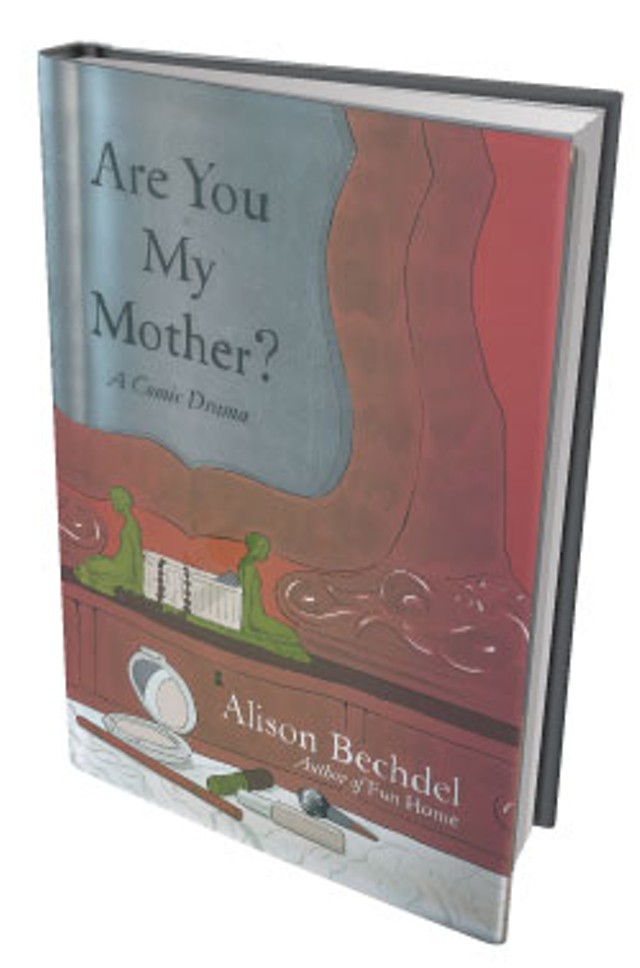Published March 6, 2013 at 2:48 p.m.
“Don’t tell anybody I showed you this,” Alison Bechdel told her fans packed into the St. Michael’s College McCarthy Arts Center last Tuesday night. She stood in front of a screen showing a slide from her beloved late comic strip, “Dykes to Watch Out For,” depicting a graphic bedroom scene. Since this is Bechdel, whose “Dykes” strip ran in feminist and alternative newspapers (including Seven Days) for 25 years, the scene involved two women, and one of them was wearing what we might call, in polite company, a marital aid. Bechdel’s audience roared.
Bechdel, 52, was at St. Mike’s to give a presentation aptly titled “The Illustrated Life of Alison Bechdel.” She had started the evening by declaring her intention to talk about “how I got from writing a comic book about a bunch of lesbians to writing about my family.” But what followed was actually much richer. It was an in-depth tour of the writer’s insight and processes from childhood through the overwhelming success of the “Dykes” series and two fantastically well-received graphic memoirs about her family: the New York Times best-seller Fun Home: A Family Tragicomic in 2006 and Are You My Mother?: A Comic Drama in 2012.
The talk began simply, with the “why” of Bechdel’s career. She grew up in Pennsylvania with parents who operated a funeral home (aka “fun home”) “in a house full of antiques, where there were secrets, and appearances were important,” she said.
Appearances were so important, she told her audience, that as she grew older she increasingly noticed what she called “slippage” between the harmonious picture her family projected to outsiders and what was really going on away from public view. So important that her closeted gay father met his end — accidentally or on purpose — by stepping in front of an oncoming truck.
Even as Bechdel could see the power of comics to tell these ironic, personal stories, she said, it took her a while to develop her own voice.
“There’s an old saying that comics are for people who are mediocre writers and mediocre artists. In my case, those things are pretty much true,” the cartoonist said, as the screen showed a rejection letter from a graduate arts program that she noted was “one of several.”
As Bechdel spoke, another rejection letter appeared on the screen behind her, this one from a literary magazine.
“I decided that if the art wasn’t working, I would try the writing … but no.”
That’s when, Bechdel said, she realized she could put the two art forms together to illustrate the tension between what she thought her life was “supposed” to be like and what it really was like.
Next, the cartoonist moved on to the “how” of her work, reading chapters from both books and walking the audience through the painstaking process she used to create them. Even Bechdel’s most ardent admirers may not know that she often takes snapshots of herself to use as the basis of her drawings. For Are You My Mother?, this meant dressing up as her mother and setting a camera on a timer to take aerial shots from the loft in her house in Bolton. Bechdel showed a series of those photos, and the audience laughed and applauded every one.
Then again, her audiences — this one composed of college students and community members of all ages — would likely dote on anything she had to say. Bechdel has a strong following, and, in particular, many gay and lesbian individuals are grateful to her for giving their lives visibility and recognition through her characters.
“I remember feeling so lucky to find those little half-sized comic books. As I was coming out as a lesbian, I found so much hope in Alison’s characters,” said Julia Berberan, director of the Center for Women and Gender at St. Mike’s, when she introduced Bechdel. “I felt they understood what was going on. They reassured me that I was not alone, and that I could really live the life I wanted to live.”
The mood during Bechdel’s talk ranged from earnest to jokey. Joanna Beall, who teaches creative writing at Burlington College, asked Bechdel during a Q&A after her talk why she always used reality as the basis for her work.
“To piss off my mother,” Bechdel quipped, to more laughter and applause. “It’s something inherent in my identity that telling these true stories has felt important. But it’s very difficult,” she continued. “My family is not psyched about all this. I don’t recommend it … unless you’re trying to piss off your family. Then it works really well.”
Alison Bechdel’s latest book is "Are You My Mother?: A Comic Drama." Houghton Mifflin Harcourt, 304 pages. $22 hardcover. It was recently nominated for an LA Book Prize in the graphic novel/comics category; winners will be announced on April 19. dykestowatchoutfor.com/blog
The print version of this article was headlined "Cartoonist and Graphic Memoirist Alison Bechdel Talks About Telling Her True Stories".
More By This Author
Speaking of...
-

Williston's Champion Comics & Coffee Combines Two of Nerdom’s Favorite Things
Apr 12, 2023 -

Tillie Walden to Become Next Cartoonist Laureate of Vermont
Mar 3, 2023 -

Origin Story: How Burlington’s Earth Prime Comics Helped Unite Vermont’s Comics Lovers
Mar 2, 2022 -

Video: Alison Bechdel Shares 'The Secret to Superhuman Strength'
May 6, 2021 -

A Virtual Welcome to Vermont's New Cartoonist Laureate, Rick Veitch
Apr 2, 2020 - More »
Comments
Comments are closed.
From 2014-2020, Seven Days allowed readers to comment on all stories posted on our website. While we've appreciated the suggestions and insights, right now Seven Days is prioritizing our core mission — producing high-quality, responsible local journalism — over moderating online debates between readers.
To criticize, correct or praise our reporting, please send us a letter to the editor or send us a tip. We’ll check it out and report the results.
Online comments may return when we have better tech tools for managing them. Thanks for reading.
















































